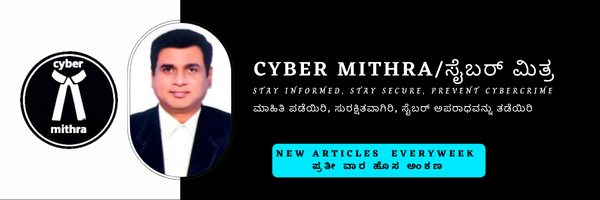Beware, Cybercriminals are using Ram Mandir for Cybercrimes
As you are aware, on 22nd January 2024, Ram Mandir was consecrated, but cybercriminals were using this Ram Mandir opening and common peoples devotion, eagerness to witness the occasion and see their Ram and get prasad as an opportunity to defraud people with various cybercrimes. Lets see below some of the cybercrimes done in the name of Ram Mandir opening on common people as per news reports:
1. Fake QR codes were sent in email and social media messages in the name of collecting donations for Ram Mandir, and any amount paid scanning them went to cybercriminals account.
2. Malicious Social Media/WhatsApp messages and emails were sent out that “You have won a lucky dip to visit Ayodhya on the Pran Pratishta day, click on link below to register”, on clicking malware will be installed and your personal and financial sensitive data is stolen, and in another associated scam, the messages would say to get invite call this number and there they would say on paying certain amount they can arrange a pass and loot people.
3. In the name of “Ram Mandir ka Prasad”, scamsters sell fake ladoos or in the name of “Authorised Ram Mandir ka temple models”, sell fake and low quality models on Amazon/Facebook and other social shopping websites and Apps.
4. A Hyperlink to photos or videos of Rama or Ayodhya temple is sent and on clicking it a malware like keylogger gets installed on your device which sends all the keystrokes you enter to the cybercriminal using which he comits various cybercrimes.
Recently Vishwa HIndu Parishad(VHP) and Ayodhya police had issued a warning on the above scams in their social media handles, websites and newspapers.
Precautions on how to protect oneself from Ram Mandir scams :-
- Always follow the principle of ‘ Zero Trust, Pause and Authenticate’ for all digital transactions and messages/offers from unknown numbers.
- Do not to reply to any unknown person’s request or any WhatsApp message sent by any unknown person without verification or donate money to anyone without verification.
- Never click on a hyperlink or scan a QR code or install any App provided in a message or mail by a stranger.
- Keep your social media profile locked or private.
- Do not accept friend requests without proper checking their background.
- Always check and verify the seller, read the comments and ratings before buying anything online.
If you are a victim of such fraud :-
Immediately call 1930 cyber helpline or file a complaint at cybercrime.gov.in website or nearby police station. Report and lodge a complaint with the seller website about the fraud. If you think your device is infected with a malware, format it or factory reset after taking backup.
Legal remedies available to the victim :-
You can register a criminal case at your nearest cyber or regular police station, under the following legal sections or the Act as per sections prescribed by the police based on your case :
- Section 378(Theft), 419 (punishment for cheating by impersonation) and 420 (cheating and dishonestly inducing delivery of property), Section 424(extract data illegally), Section 441(criminal trespass), Section 467(Forgery), Section 468(Punishment for Forgery), and Section 471(Usage of Forged document) of Indian Penal Code(IPC)
- section 43 (Penalty and compensation for damage to computer, computing device etc.), section 65 (Tampering with computer), section 66 (punishment for computer related offences – a person committing data theft, transmitting virus into a system, destroying data, hacking, or denying access to the computer or network to an authorized person), section 66C(which prescribes penalties for identity theft and states that anyone who fraudulently or dishonestly uses a person’s identity information) and Section 66D (punishment for fraud by impersonation using computer resources) under of the Information Technology Act(IT) Act 2000.


Thanks for your feedback